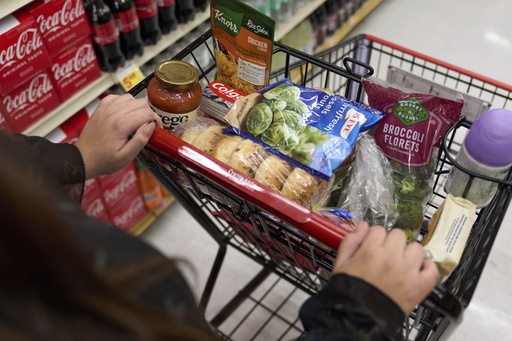
Efforts to prohibit the purchase of sugary drinks, candy, and other indulgent items through the U.S. nutritional aid program for low-income families, known as SNAP, have been ongoing. Recently, support for this initiative may gain momentum from new officials appointed by the Trump administration.
Robert F. Kennedy Jr., the recently confirmed Secretary of Health and Human Services, along with Brooke Rollins, the new Agriculture Secretary, both appear to endorse the idea of eliminating these unhealthy options from the program, which is formally known as the Supplemental Nutrition Assistance Program. Kennedy has been particularly outspoken on the matter, arguing that the nearly $113 billion program, which assists approximately 42 million individuals, should not allow benefits to be spent on items such as “soda or processed foods.”
In an interview last week with Fox News, Kennedy stated, “We absolutely need to reform the SNAP program, food stamps, and school lunches. The federal government is partially funding these purchases, and we should not be encouraging the consumption of harmful food and beverages.”
Rollins expressed eagerness to collaborate with Kennedy regarding the issue shortly after her confirmation by questioning if taxpayers are comfortable with their contributions being used to buy unhealthy foods for vulnerable children. “These are significant issues we plan to explore in the forthcoming months and years,” Rollins remarked, indicating a commitment to addressing food quality within SNAP.
However, changing what can be purchased through SNAP—widely recognized as food stamps—presents several challenges. The program is governed by the USDA rather than HHS and is implemented at the state level. The federal Food and Nutrition Act of 2008 stipulates that SNAP benefits may be redeemed for “any food or food product meant for human consumption,” aside from certain exceptions like alcohol, tobacco, and hot meals prepared for immediate consumption.
Implementing restrictions on specific items would necessitate Congressional action to amend existing laws, or states would need to obtain waivers to impose such limitations, according to Katie Bergh, a senior policy analyst at the Center on Budget and Policy Priorities. Over the last two decades, various states have called for prohibitions on using SNAP benefits for items like bottled water, soda, chips, ice cream, and “luxury meats” like steak, but their proposals have consistently been denied by both Republican and Democratic administrations.
A previous Agriculture Department paper from 2007 expressed reluctance to approve waivers, stating the absence of clear standards to define foods as either nutritious or unhealthy. Furthermore, the agency suggested that implementing restrictions could prove complex, costly, and might not effectively alter recipients’ food purchases or reduce obesity rates.
Advocacy groups fighting hunger argue that research indicates SNAP recipients are no more inclined than other low-income individuals to purchase sugary drinks or snacks. They emphasize that imposing such limitations would infringe on the autonomy and dignity of those receiving assistance, who typically receive about $187 monthly, or roughly $6.16 a day.
“This appears to be another tactic to reduce benefits,” stated Gina Plata-Nino, a deputy director with the Food Research and Action Center, a nonprofit advocacy group. “It raises concerns regarding how we can further restrict and stigmatize vulnerable populations.”
Several legislative proposals are currently under consideration in both Congress and state legislatures aimed at prohibiting SNAP funds from covering soft drinks, candy, and other items deemed unhealthy. Representative Josh Breechan, a Republican from Oklahoma, is backing the Healthy SNAP Act.
“If individuals wish to spend their own money on junk food, that’s their choice. However, we should not expect taxpayers to foot the bill and also bear the costs associated with the resulting health issues,” Breechan remarked.
One SNAP beneficiary, Martina Santos, 66, from New York City, mentioned her typical monthly benefit of $291 goes towards essential items like meat, oil, milk, and coffee. She also supplements her groceries with fresh produce from a local food pantry, where she volunteers. Due to her health conditions, including diabetes, Santos emphasizes the importance of using her benefits on nutritious foods.
“SNAP should be used to promote healthy eating habits to help mitigate the rise in diseases such as obesity and diabetes,” she explained.
In Kansas and other regions, proposed legislation aiming to ban soft drinks and candy expose the complexities of such regulatory changes. Numerous proposals would prevent SNAP from covering soft drinks but permit milk-based beverages, or juices composed of over 50% fruit or vegetable content. Interestingly, items like Kit Kat and Twix bars would remain eligible since they contain flour, and certain sugary beverages, as long as they meet the fruit juice threshold, would also still qualify for purchase.
These intricacies have stalled modifications to the SNAP program for years. Nevertheless, experts like Dr. Anand Parekh from the Bipartisan Policy Center suggest that recent developments could shift the conversation.
The momentum established by Kennedy’s “Make America Healthy Again” initiative may usher in a renewed focus on improving dietary solutions, which can address key risk factors tied to diseases and mortality.
“When discussing SNAP, it’s crucial to remember the ‘N’ stands for nutrition,” Parekh remarked. “Now is the time for bipartisan efforts to innovate and enhance dietary quality and nutritional offerings within the program.”

